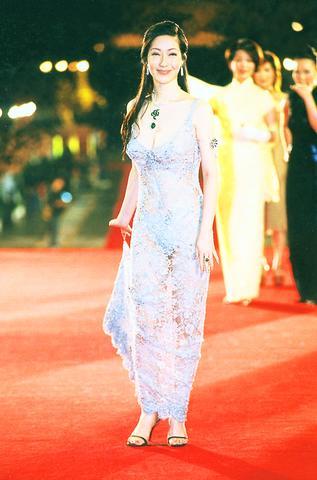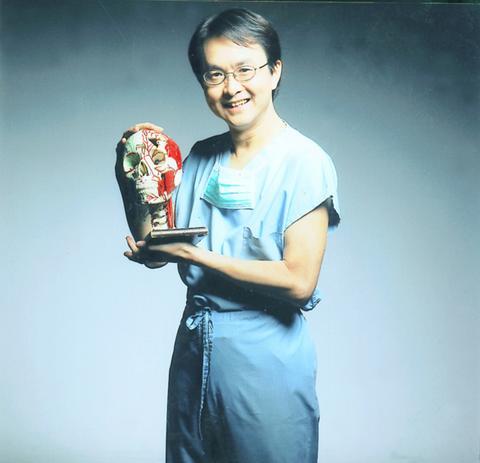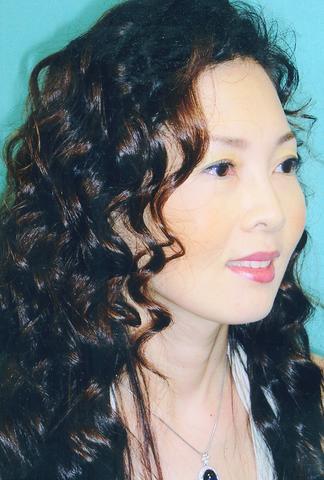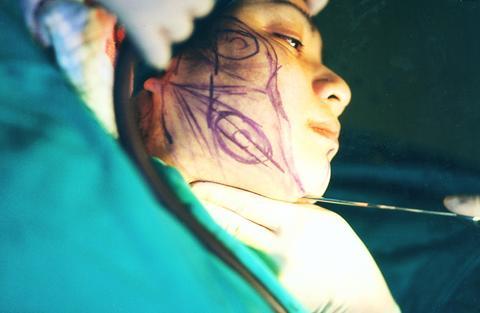"Mirror, mirror, am I the most perfect woman of all? Should I make my nose just a bit higher? Maybe do the eyelids again? Oh! look at the wrinkles, maybe I should have my face lifted some time ..."
Rosalyn Ku (顧婕) is the kind of woman who likes to look in the mirror every day and examine her face to figure out what procedure she should undergo next. Since the age of 15, she has has had plastic surgery 25 times. Now 37 years old, her friends have given her the nickname the "queen of plastic surgery."

PHOTO COURTESY OF ARTIST PLASTIC SURGERY CLINIC
To make her originally single-lidded eyes double-lidded, like Caucasians, she has had nine operations over the last 10 years. "The first time the doctor used the `sewing' method. But the crease was not so obvious. The second time another doctor used the `cutting' method. The third time, however, the doctor made the crease too high on my right eye. It was horrible, so I had to do the surgery many more times," Ku said.

To make her face look like Brooke Shields -- her idol when she was young -- Ku began "fixing" her teeth at the age of 15, getting rid of three "tiger teeth." She also started on her nose by inserting artificial cartilage to pad out her nose column. The second time the artificial cartilage was replaced by a small piece of cartilage from her ear. In total she has had surgery four times on her nose and five times on the teeth.
In Ku's own words, her journey of discovery into the world of plastic surgery was "like Dr. Sun Yat-sen's revolution." in that she experienced 10 failures. "I'm not afraid of making public all these experiences. I pursue beauty and I have made full use of the technologies in the beauty industry. I believe that times have changed and there's nothing that can't be talked about," Ku said.

The ROC Plastic Surgery Association said there were 1 million procedures done last year, double the amount five years ago. "Among my patients, more and more of them are being open about having plastic surgery. They admit to their friends and relatives, `Yes, I've done it, and more than once,'" said Dr. James Chang (張炯銘), a surgeon from the Artist Plastic Surgery Clinic (藝術家整形外科診所).

Walking into Chang's clinic on Taipei's busy Zhongxiao East Road, the elegantly appointed reception room is filled with patients and surgery nurses with green uniforms. "Look at this picture of Nicole Kidman. Her cheekbone is up here, but her cheeks are still skinny," said a beauty consultant trying to persuade a client to undergo liposuction on her cheeks and create more definition on her face.
"On busy days I have five to six operations a day," said Dr. James Chang. "We even have midnight surgery appointments." In total, the clinic does 3,000 surgery procedures a year.
Following Chang's advice, Ku underwent what Chang calls "lipo-sculpture" to make her face slimmer. That is, the surgeon sucks out fat from the face and uses his hands to mould the adipose tissue remaining. The lipo-sculpture procedure has finally given the round-faced Ku a defined face and sharper chin. "Now my body and face are all perfect. I have to thank Dr. Chang for all this," she said.
Ku may may have been a trail blazer with plastic surgery and has even published a book about her experiences, the Queen of Plastic Surgery, but a new generation of Taiwanese are now getting in on the act. At Artist Plastic Surgery Clinic, the youngest patient was 16 years old, asking for advice to re-shape her face.
"Changing their facial features is in vogue among the younger generation," Lin Chin-yun (林靜芸), the founder of Jane's Clinic of Plastic Surgery was quoted as saying in local media.
A survey conducted by the Department of Journalism at Chinese Culture University (文化大學) found 55 percent of respondents, of both genders, were willing to have cosmetic surgery simply in order to improve their appearance and increase self-confidence.
Taiwan is well placed to take advantage of these trends. According to Chang Kuo-hua (張國華), another Taipei-based cosmetic surgeon, the price for double eyelids and a higher nose are cheaper than in South Korea, the country that has recently gained notice for its "plastic surgery street" in Seoul. "They cost nearly half the price of [competitors] in Korea," Kao said.
Many hospitals in Taipei have now opened special plastic surgery clinics (distinct from plastic surgery clinics for medical purposes), such as Taipei Municipal Wan Fang Hospital and Taipei Municipal Chinese Medicine Hospital.
There has also been an increase in the number of medical school students who choose plastic surgery. "Plastic surgery is among the top five choices for surgery-major students," said Chang. "In a way, it's riskless and high profit. Compared to doing surgery on the brain or the heart, you are liable to make less fatal mistakes in plastic surgery," he said.
Looking at the "nationwide movement" towards plastic surgery, some scholars reason that it's not because Taiwanese look at themselves in the mirror too much, but rather they are too influenced by the beautified and commodified images in the mass media.
Professor Chang Chin-hua (張錦華) from the Institute of Journalism at National Taiwan University has done long-term research on cosmetic and body-slimming advertisements in all media. She found that over the last eight years, cosmetic ads have been among the five most popular types, with spending above NT$3 billion a year in 1994 and 1995.
Her conclusion is that Taiwanese women have become major consumers and have boosted the business of body-slimming, cosmetics and plastic surgery immensely.
"When women gain economic clout and social independence, they don't necessarily give up traditional values," Chang said. "Instead, they can be more drawn to the images brought by media culture."
For example, less than 15 percent of Taiwanese women take exercise or go to gyms, Chang said. "That is, they don't resort to exercise, instead, they choose a method with more immediate results," she said.
Also, Chang said, the images of American popular culture promoted by the powerful Hollywood machine, was another factor for Taiwanese pursuing beauty.
"The beauty industry mobilizes stars, celebrities and the fashion industry to promote the business," she said. "What's worse is you never get satisfied. You never know what really is a perfect image," she said.
As for Rosalyn Ku, after going under the knife 25 times in search of beauty? "I'm pretty satisfied with my looks and body now. I think if there are any small flaws, it will be at least five to six years later. And at that time, we will see," she said.

Aug. 25 to Aug. 31 Although Mr. Lin (林) had been married to his Japanese wife for a decade, their union was never legally recognized — and even their daughter was officially deemed illegitimate. During the first half of Japanese rule in Taiwan, only marriages between Japanese men and Taiwanese women were valid, unless the Taiwanese husband formally joined a Japanese household. In 1920, Lin took his frustrations directly to the Ministry of Home Affairs: “Since Japan took possession of Taiwan, we have obeyed the government’s directives and committed ourselves to breaking old Qing-era customs. Yet ... our marriages remain unrecognized,

During the Metal Ages, prior to the arrival of the Dutch and Chinese, a great shift took place in indigenous material culture. Glass and agate beads, introduced after 400BC, completely replaced Taiwanese nephrite (jade) as the ornamental materials of choice, anthropologist Liu Jiun-Yu (劉俊昱) of the University of Washington wrote in a 2023 article. He added of the island’s modern indigenous peoples: “They are the descendants of prehistoric Formosans but have no nephrite-using cultures.” Moderns squint at that dynamic era of trade and cultural change through the mutually supporting lenses of later settler-colonialism and imperial power, which treated the indigenous as

An attempt to promote friendship between Japan and countries in Africa has transformed into a xenophobic row about migration after inaccurate media reports suggested the scheme would lead to a “flood of immigrants.” The controversy erupted after the Japan International Cooperation Agency, or JICA, said this month it had designated four Japanese cities as “Africa hometowns” for partner countries in Africa: Mozambique, Nigeria, Ghana and Tanzania. The program, announced at the end of an international conference on African development in Yokohama, will involve personnel exchanges and events to foster closer ties between the four regional Japanese cities — Imabari, Kisarazu, Sanjo and

By 1971, heroin and opium use among US troops fighting in Vietnam had reached epidemic proportions, with 42 percent of American servicemen saying they’d tried opioids at least once and around 20 percent claiming some level of addiction, according to the US Department of Defense. Though heroin use by US troops has been little discussed in the context of Taiwan, these and other drugs — produced in part by rogue Chinese Nationalist Party (KMT) armies then in Thailand and Myanmar — also spread to US military bases on the island, where soldiers were often stoned or high. American military policeman